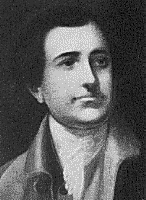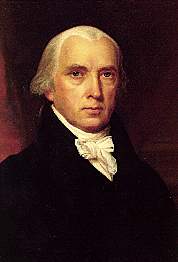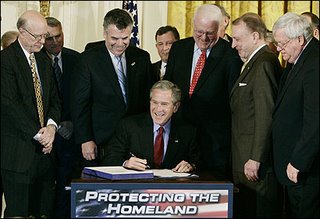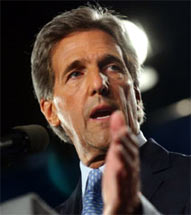ABA: Bush Signing Statements "...contrary to the rule of law."
 Edmund Randolph was one of the 'founding fathers' of this nation.
Edmund Randolph was one of the 'founding fathers' of this nation.Randolph was an influential statesman in early United States history. As reported:
"Randolph continued to advance in the political world. He became mayor of Williamsburg and Virginia's attorney-general. In 1779 he was elected to the Continental Congress, and in November 1786 Randolph became Governor of Virginia. In 1786 he was a delegate to the Annapolis Convention.Randolph was leary of an over-powerful central Executive and actually advocated for a three-man council instead of the single President. As also noted in the same article:
Four days after the opening of the federal convention in Philadelphia, on May 29, 1787, Edmund Randolph presented the Virginia Plan for creating a new government. This plan proposed a strong central government composed of three branches, legislative, executive, and judicial, and enabled the legislative to veto state laws and use force against states that failed to fulfill their duties. After many debates and revisions, including striking the section permitting force against a state, the Virginia Plan became in large part the basis of the Constitution."
"...he was especially wary of creating a one-man executive. He preferred a three-man council since he regarded "a unity in the Executive" to be the "foetus of monarchy."Randolph sounds almost prescient when he was quoted by the Judiciary Committee in 1974, investigating the impeachment of President Clinton, when they noted:
"The Executive will have great opportunitys of abusing his power; particularly in time of war when the military force, and in some respects the public money will be in his hands. Should no regular punishment be provided it will be irregularly inflicted by tumults & insurrections."It is indeed in times of war that we find this President seeking to expand his powers by assuming Legislative, Judicial, and Executive powers combined.
 James Madison warned of the dangers of a Chief Executive who usurped power from the other branches of government. Writing as Publius in Federalist Paper #47, Madison stated:
James Madison warned of the dangers of a Chief Executive who usurped power from the other branches of government. Writing as Publius in Federalist Paper #47, Madison stated:"The reasons on which Montesquieu grounds his maxim are a further demonstration of his meaning. "When the legislative and executive powers are united in the same person or body," says he, "there can be no liberty, because apprehensions may arise lest THE SAME monarch or senate should ENACT tyrannical laws to EXECUTE them in a tyrannical manner. " Again: "Were the power of judging joined with the legislative, the life and liberty of the subject would be exposed to arbitrary control, for THE JUDGE would then be THE LEGISLATOR. Were it joined to the executive power, THE JUDGE might behave with all the violence of AN OPPRESSOR. " Some of these reasons are more fully explained in other passages; but briefly stated as they are here, they sufficiently establish the meaning which we have put on this celebrated maxim of this celebrated author."President Bush has defied the Constitution with his use of "Signing Statements" that amount to rewriting laws and determining their Constitutional interpretation in 'one fell swoop'.

As first reported in the Boston Globe on April 30, 2006:
"WASHINGTON -- President Bush has quietly claimed the authority to disobey more than 750 laws enacted since he took office, asserting that he has the power to set aside any statute passed by Congress when it conflicts with his interpretation of the Constitution.John W. Dean, President Nixon's former White House lawyer has written about Bush's signing statements:
Among the laws Bush said he can ignore are military rules and regulations, affirmative-action provisions, requirements that Congress be told about immigration services problems, ''whistle-blower" protections for nuclear regulatory officials, and safeguards against political interference in federally funded research.
Legal scholars say the scope and aggression of Bush's assertions that he can bypass laws represent a concerted effort to expand his power at the expense of Congress, upsetting the balance between the branches of government. The Constitution is clear in assigning to Congress the power to write the laws and to the president a duty ''to take care that the laws be faithfully executed." Bush, however, has repeatedly declared that he does not need to ''execute" a law he believes is unconstitutional."
"It is remarkable that Bush believes he can ignore a law, and protect himself, through a signing statement. Despite the McCain Amendment's clear anti-torture stance, the military may feel free to use torture anyway, based on the President's attempt to use a signing statement to wholly undercut the bill.Earlier today, the American Bar Association, through an eleven member bipartisan panel found reason to challenge this President's use of "signing statements".
This kind of expansive use of a signing statement presents not only Presentment Clause problems, but also clashes with the Constitutional implication that a veto is the President's only and exclusive avenue to prevent a bill's becoming law. The powers of foot-dragging and resistance-by-signing-statement, are not mentioned in the Constitution alongside the veto, after all. Congress wanted to impeach Nixon for impounding money he thought should not be spent. Telling Congress its laws do not apply makes Nixon's impounding look like cooperation with Congress, by comparison.
The longer term impact of signing statements is potentially grave - and is being ignored by the Bush administration. But it cannot be ignored forever. Defiance by Bush of Congressional lawmaking will come back to haunt this President."
As reported:
"The bar association panel said the use of signing statements in this way was “contrary to the rule of law and our constitutional system of separation of powers.” From the dawn of the Republic, it said, presidents have generally understood that, in the words of George Washington, a president “must approve all the parts of a bill, or reject it in toto.”How long shall Congress tolerate this President's abuse of Executive powers? How long shall Congress sit by idly while this President ignores their legislative responsibilities and chooses to follow or ignore laws on his whim?
If the president deems a bill unconstitutional, he can veto it, the panel said, but “signing statements should not be a substitute for a presidential veto.”"
Senator Kerry spoke up against this President's abuse of 'signing statements' during his objection to the Alito nomination.
 John Kerry had this to say:
John Kerry had this to say:“President Bush has taken the practice of issuing signing statements to a new level. Most recently, he used a signing statement to reserve the right to ignore the ban on torture that the Congress overwhelmingly passed. He also used signing statement to attempt to apply the law restricting habeas corpus review of enemy combatants retroactively—despite our understanding in Congress that it would not affect cases pending before the Supreme Court at the time of passage.The threat to America is not from embryonic stem cells that offer the promise of the cure to disease.
“The implications of President Bush’s signing statements are astounding: his Administration is reserving the right to ignore those laws it does not like. Only one thing can hold the President accountable: the Supreme Court. I am not convinced that will happen if Judge Alito is confirmed.
“Reigning in excessive government power matters more today than ever before as we work to find the balance between protecting our rights and our safety. As Justice O’Connor said, the war on terror is not a blank slate for government action. We can—and must—fight it in a manner consistent with the Constitution.
The threat to America is not from the rare political extremist who burns an American flag.
Nor is it from a Court, acting to protect the widest divergence of religious belief possible who sees that requiring school children to recite pledges "under God" might have a 1st Amendment problem.
No. America is under threat not from without but from within. From a President who prevents testimony to Congress, starts unnecessary wars on false pretenses, and who flaunts the Constitution, embracing power and authority not truly given to him by the very Founding Fathers who worried about this Executive malfeasance.
We need the leadership of Senator John Kerry now more than ever! Keep on coming John! We have got your back!
Bob













2 Comments:
You're getting pretty fancy Bob! great post.
Marie,
Thanks for the kind words. I learned everything I know about blogging from you! Well at least a lot of it :).
Bob
Post a Comment
<< Home